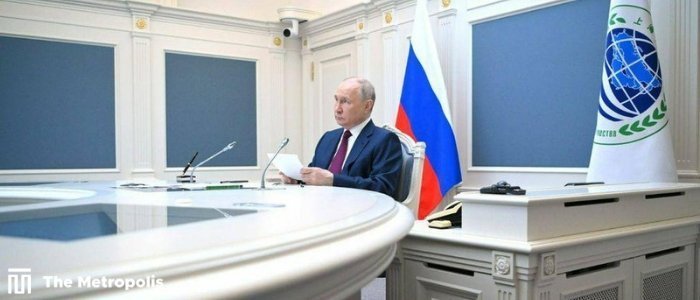Metropolis Desk-
Following Moscow’s invasion of Ukraine, President Vladimir Putin has stated that Russia will continue to defy Western sanctions. His speech at a fictitious summit of the Shanghai Cooperation Organization was his first before a global gathering following the Russian mutiny last month.
Mr. Putin supported SCO trade agreements in local currencies, which were considered a means of avoiding sanctions.
The SCO summit in 2023 is virtually taking place, with India serving as the host.
Russia “counters all these external sanctions, pressures, and provocations” and “continues to develop as never before,” Mr. Putin declared, using the platform to deliver a message of defiance to the West.
Since the Wagner mercenary squad launched a short-lived mutiny in late June, he has made several public appearances, but this was the first occasion he was spotted with a group of world leaders.
“I would like to thank my colleagues from the SCO countries who expressed support for the actions of the Russian leadership to protect the constitutional order and the life and security of citizens,” he said in a televised address to the summit from the Kremlin in Moscow.
More than 80% of transactions between Chinese and Russian citizens were conducted in roubles and yuan, Mr. Putin continued, urging other SCO members to adopt the same practice.
He also praised Belarus’ proposal to join the SCO permanently as a future member. Belarus is a close ally of Russia.
Indian Prime Minister Narendra Modi, who is also hosting the summit, urged participants to increase commerce, connectivity, and technological cooperation.
However, he avoided making direct mention of either the conflict in Ukraine or China’s escalating assertiveness in the Indo-Pacific. Due to its previously non-aligned status, India had to walk a fine diplomatic line because of its growing links to the West.
Just a few days prior, the US had welcomed Mr. Modi with open arms during his state visit to Washington.
China, a neighbor with whom India has long-standing adversarial relations, was not mentioned by Mr. Modi when he spoke about regional security. In 2020, deadly skirmishes took place on the long-disputed border between Indian and Chinese forces, and tensions still exist today.
Despite Delhi’s official denials, the West increasingly views India as a counterweight to China. And at the SCO, it did not do so once more.
Instead, India’s PM urged participants to work together to combat international terrorism.
The SCO shouldn’t be afraid to criticize such nations, according to Mr. Modi, who said that some nations exploit cross-border terrorism as a tool in their policies and provide a safe haven for terrorists.
Such words are always taken to be directed towards Pakistan, India’s longtime enemy, and neighbor. Its Prime Minister, Shahbaz Sharif, stated that SCO members must take action to “combat the three evils of terrorism, extremism, and separatism”. He added, though, that religious minorities should not be vilified in the “pursuit of domestic political agendas”—a jibe at India, which Pakistan, a Muslim-majority nation, frequently accuses of failing to defend Muslim rights.
Evidence that the majority-Hindu nation of India’s government is failing to uphold the rights of minorities has never been accepted by Mr. Modi’s administration.
When it was President Xi Jinping’s turn to speak, he stressed the significance of maintaining regional stability and peace. To “follow the right path and strengthen their solidarity and mutual trust,” he urged the SCO members.
Maintaining stability in Afghanistan following the Taliban takeover following the withdrawal of US troops two years ago was one issue that all members appeared to agree on unanimously.
More details on how SCO states intend to cooperate in Afghanistan should be revealed in a joint statement that is anticipated soon.
The SCO was established in 2001 as a response to Western dominance in the region by China, Russia, and four Central Asian nations. In 2017, Pakistan and India joined.
As their ties with the West have worsened, the group has gained more significance for Russia and China.
Despite the existence of more well-known forums like the G20 and G7, as well as the BRICS (Brazil, Russia, India, China, and South Africa), experts say the group’s potential cannot be understated.
The SCO accounts for more than 20% of global GDP and almost 40% of the world’s population. By including Iran, the number of oil reserves under its control will be close to 20%.
The SCO’s energy portfolio will increase with Iran’s admittance as a full member at this year’s gathering, but it will infuriate Western capitals. It may become more difficult for India to achieve a diplomatic balance between its many international allies as the SCO is increasingly placed against Western-led forums.
However, Indian diplomats assert that they are confident in their ability to maintain an independent foreign policy without caving into any particular faction. The future of the SCO will be influenced by how Delhi handles its diplomatic relations, particularly its disagreements with Pakistan, China, and Russia.
Source- BBC News



